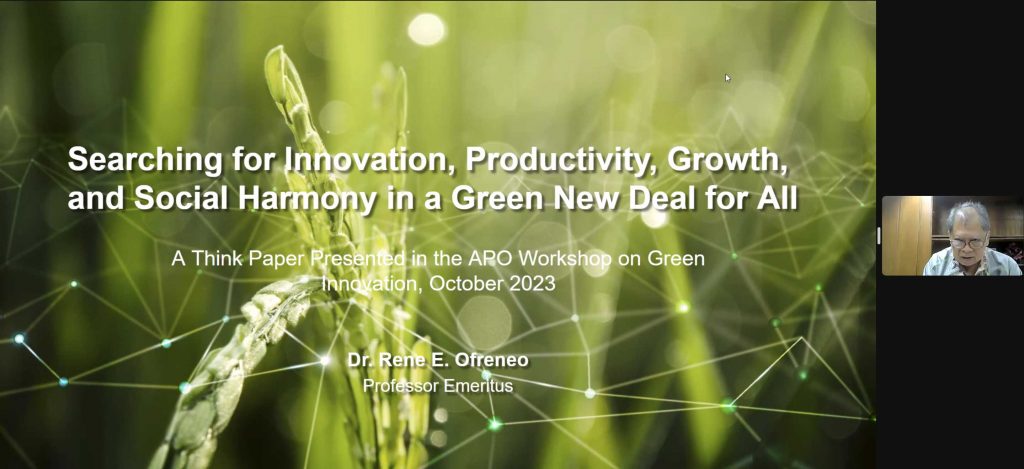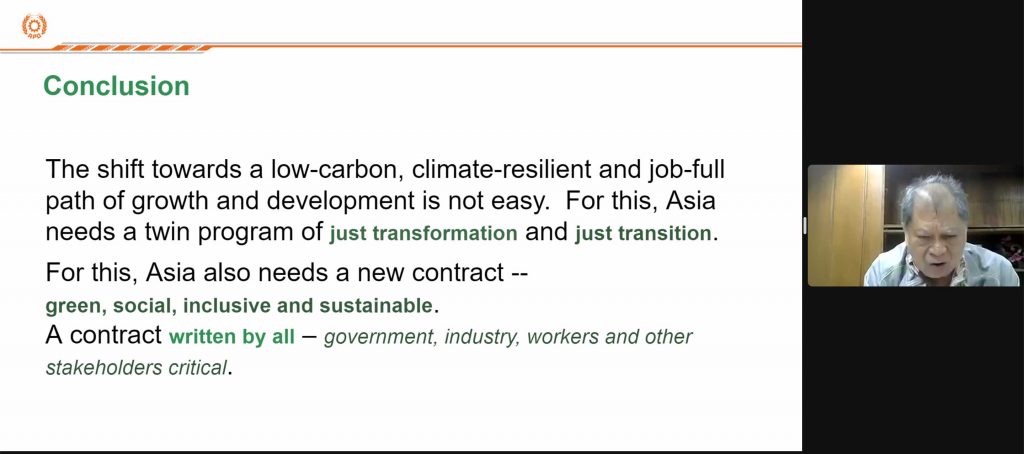Overview
Green Transformation would require a new “contract†among stakeholders that is green, sustainable, and inclusive. During the Asian Productivity Organization (APO) Virtual Workshop on Green Innovation held in October 2023, Dr. Rene Ofreneo, Professor Emeritus of the University of the Philippines, shared his thoughts on combining innovation, productivity, and growth.

Pioneering Green Productivity
Since 2002, the APO has advocated for green productivity, hinged upon a heavily agrarian landscape among its member economies. This was a call to the public sector to steer growth, innovation, and productivity toward a green economy.
In the wake of the 2008 global financial crisis, Green Productivity emerged as a lifeline for economies, offering an opportunity to address the looming climate crisis. By directing efforts towards renewable energy, societies can simultaneously foster job creation and access to cleaner, more affordable energy.
The New Green Deal
The New Green Deal was a proposal for the G20 countries to shift to clean, renewable energy and support the labor force behind green jobs. This meant investing in restructuring the traditional energy-reliant societies and creating new jobs that give way to environmentalists and indigenous and vulnerable communities that stand to protect their homes, consisting of the ecosystems that require high-level environmental protection.
The Paris Agreement and the Sustainable Development Goals
In the field of green innovation and combating the climate crisis, the Paris Agreement and the Sustainable Development Goals (SDGs) took center stage in 2015. The Paris Agreement stands as a legally binding climate change treaty, aiming to cap global temperature increases to just 1.5°C, a marked improvement from the anticipated 2°C rise in the status quo.
As another instrument of the United Nations, the SDGs obligated member states to adopt the 17 SDGs based on the five interconnected pillars: People, Planet, Prosperity, Peace, and Partnership, all to be realized by 2030.
Professor Ofreneo advocates for these instruments despite the prevailing environmental challenges. He implores governments to shift towards greener alternatives and structures.
The Future of Sustainable Development
Harking back to the 1987 World Commission on Environment and Development’s report, “Our Common Future,” the principle of sustainable development resounds: it should fulfill the present needs without jeopardizing future generations’ ability to meet their own needs.

To achieve this vision, there must be alignment in the environmental, political, and economic agendas. This synchrony must serve the immediate necessities while ensuring the world’s continued rotation, promising a secure future. This said synchronization must occur under a regional policy framework, with national accountability, but with an impact that can be observed and felt across Asia, as Professor Ofreneo concludes.
Embracing Social Justice in the Green Transition
Professor Ofreneo’s perspective expands to social justice within the framework of the green transition. He acknowledges the “controversial” and “radical” nature of the Climate Justice movement. Nevertheless, he recognizes its value in advocating for a holistic approach: environmental protection equates to safeguarding the most economically vulnerable communities.
He concludes with a battle cry: for all sectors and communities to unite in the pursuit of a Green Transformation.
In his words, “Green innovation requires green investment.”
